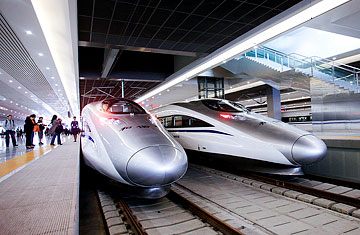
A high-speed connecting Shanghai and Hangzhou waits for passengers prior to the train's inaugural trip from Shanghai on Oct. 26, 2010
The Feb. 12 announcement of the dismissal of China's railway minister has been an embarrassment for a transport system that has been a symbol of the country's rapid growth. Liu Zhijun was sacked over the weekend for "severe violation of discipline," according to the state-run Xinhua news service, and is under investigation by the Communist Party for suspected corruption in rail building contracts.
Liu, who was appointed to the position in 2003, helped lead the country's development of its internationally lauded high-speed rail. Since the opening of its first high-speed line in 2003, China has built 8,358 km of high-speed tracks that can carry trains at over 200 km/h. One month before his dismissal Liu said that China would reach 16,000 km of high-speed rail by 2015. During his state of the union address in January, U.S. President Obama cited China's fast trains in announcing his goal to give 80% of Americans access to their own high-speed rail system within 25 years.
Chinese companies have begun competing for rail projects abroad, and last year the state-owned China Railway Construction Corporation completed a metro line in the Saudi holy city of Mecca. The project was a technical success, but the pressure Beijing exerted on its company to complete the project resulted in a $600 million loss for the firm. China is also in talks to build a rail line through Colombia that would serve as an alternative to the Panama Canal, the Financial Times reported Feb. 13.
At home, China's rail building binge has been met with both satisfaction at the improvements in speed and quality and doubts about whether the massive investment is necessary for a developing nation. The expensive high-speed tickets did little to ensure smooth travel during this year's Spring Festival travel period, when some 200 million migrant workers travel home from China's cities to celebrate the holiday. This year saw the season's usual explosion of complaints from people who were unable to get a cheap train ticket, with travelers again forced to buy from scalpers or end up with tickets that only permit them to stand for long distances. Others had to buy the pricier high-speed rail tickets or even fly, an expensive prospect for average workers.
The ticketing system, which sets aside seats for government officials, has created ample opportunities for graft, especially during periods of high demand. So has the massive size of the railway ministry, which employs 2.5 million staff, and the size of its expansion plans. In 2009 spending on railroad construction climbed more than 80% to reach $88 billion, and it is expected to surpass $700 billion this decade. "Whenever you have a very large project with a lot of money invested, and in the Chinese railway sector investment has exploded with huge amounts of money funneled in without significant supervision sometimes, it's hard to imagine there wouldn't be rigged bids," says Dali Yang, a political science professor at the University of Chicago.
Liu has yet to be charged with a specific crime while he is under investigation by the Communist Party's disciplinary body. He is the highest level official to be dismissed for corruption since disgraced Shanghai party boss Chen Liangyu was removed from office in 2006. Chen was sentenced to 18 years in prison in 2008. As with Chen, Liu's prosecution would have been approved by high level officials. Allegations of Liu's corruption have circulated online for months. His younger brother, a railway official in Wuhan, was given a suspended death sentence in 2006 for taking more than $3 million in bribes and hiring assassins to kill a man who ran a lodging house. So far the elder Liu hasn't been linked to such violence. In an article published this week and since removed from its website, the groundbreaking Chinese business publication Caixin reported that he was connected with Ding Shumiao, a Shanxi businesswoman whose empire includes railway construction and coal hauling. She is also under investigation, the magazine reported.
Rail officials have responded quickly to the Chinese public's concerns that the alleged corruption may have affected the quality of the newly built lines. In a Feb. 13 teleconference with rail ministry employees, Liu's replacement, General Administration of Customs chief Sheng Guangzu, stressed the need to ensure safety, eliminate corruption in railway construction and pursue the government's rail development goals, the rail ministry reported on its website. Given that development targets have already been approved, it's unlikely that Liu's dismissal will immediately slow down China's high-speed push. But that may change after China begins a leadership transition next year, says Yang. "As the new leadership takes on this issue, it may be thinking of how to justify this spending," Yang says. "When that reckoning comes, it may affect further investment."
